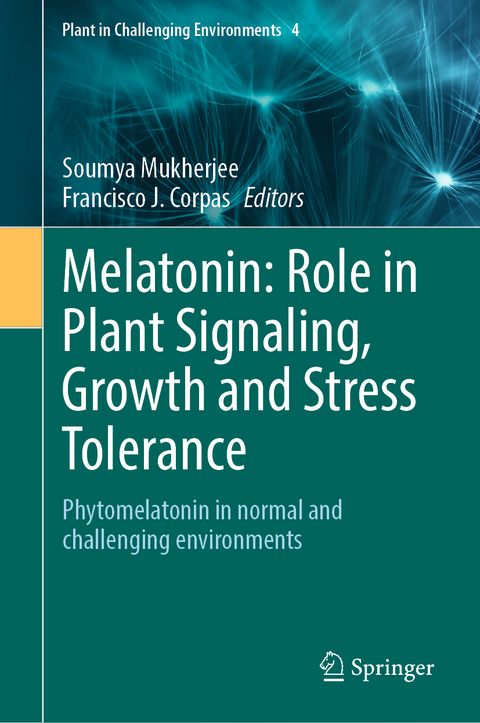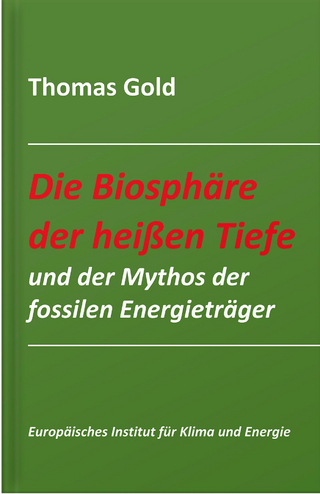
Melatonin: Role in Plant Signaling, Growth and Stress Tolerance
Springer International Publishing (Verlag)
978-3-031-40172-5 (ISBN)
The new edited volume on phytomelatonin and its diverse roles in plants under a challenging environment shall be an important reference book with updated information and future perspectives on the involvement of this biomolecule in stress resilience in plants. Investigations on different aspects of melatonin in plants have undergone a prolific surge in the last decade. In view of such a considerable volume of investigations in melatonin, the proposed new volume will collate its role in different aspects of plants signaling, growth and metabolism. In this context, it has been important to understand its function as a stress priming molecule that executes associative synergistic relation with various other plant growth regulators (viz. nitric oxide, hydrogen sulfide, inorganic ions, and enzymes). Thus, crop management under diverse stressful environments can be better achieved by elucidating our current understanding of the role of melatonin and its interplay with various plant metabolites. The book shall provide a collation of recent advancements in genomic, transcriptomic, and metabolomic approaches to decipher the molecular mechanisms of melatonin signaling and its agronomic importance in plants.
lt;p>Assistant Professor Dr. Soumya Mukherjee is a faculty member in the Department of Botany, Jangipur College, University of Kalyani, India. His research interest lies in deciphering the role of melatonin and associated signaling molecules in regulating the salt-stress physiology of plants. He has worked as a CSIR- research fellow in the area of abiotic stress physiology of plants. He has published both research and review articles in various peer-reviewed journals (according to Scopus database with H-index 17). He has also published four edited volumes in Plant signaling, and communication (springer), Rhizobiology (springer), Crop sustainability and IPR, (Apple academic press-CRC) and Strigolactone, Alkamide and Karrikins (CRC press). He is serving as an associate editor in the editorial board of Plant Signaling and Behaviour, Taylor and Francis. He has also authored an e-learning module in Plant Physiology and Biochemistry published as an effort of National Mission on Education through ICT, MHRD Project undertaken by University of Delhi, India.
Prof. Francisco J. Corpas is a Research Professor of the Spanish National Research Council (CSIC) who has more than 30 years of research experience in the metabolism of Reactive Oxygen, Nitrogen, and Sulfur Species (ROS, RNS, and RSS, respectively) in higher plants under physiology and environmental stress conditions using either the model plant Arabidopsis thaliana as well as plants of agricultural interest. Special interests are the implications of these reactive species in fruit ripening and the nitro-oxidative metabolism of plant peroxisome. He was the Head of the Department of Biochemistry, Cell and Molecular Biology of Plants (2014-2018) at the Research Institute named "Estación Experimental del Zaidín"-CSIC, Granada Spain. He already published more than 285 refereed research papers/review articles in peer-reviewed journals (according to the Scopus database with h-index: 78) and edited twelve books
Preface.- I. Melatonin as an antioxidant.- Chapter 1. Melatonin and the metabolism of reactive oxygen species (ROS) in higher plants.- II. Melatonin, biosynthesis, plant growth, development and reproduction.- Chapter 2. Melatonin in Plants: Biosynthesis, Occurrence and Role in plants.- Chapter 3. Abiotic stress-induced modulation of melatonin biosynthesis accompanying phytohormonal crosstalk in plants.- Chapter 4. Role of melatonin in embryo, seed development and germination.- Chapter 5. Melatonin metabolism in seeds: physiological and nutritive aspects.- Chapter 6. Melatonin in plant growth and signaling.- Chapter 7. Functions and prospects of melatonin during pre-fertilization reproductive stages in plants.- Chapter 8. Melatonin and fruit ripening physiology: crosstalk with ethylene, nitric oxide, hydrogen peroxide and hydrogen sulfide.- Chapter 9. Melatonin and postharvest biology of fruits and vegetables: augmenting the endogenous molecule by exogenous application.- Chapter 10. Melatonin language in postharvest life of horticultural crops.- III. Melatonin and its signaling in biotic and abiotic stress.- Chapter 11. Melatonin-mediated regulation of biotic stress responses in plants.- Chapter 12. Emerging roles of melatonin in mitigating pathogen stress.- Chapter 13. Eco-physiological and morphological adaptive mechanisms induced by melatonin and hydrogen sulfide under abiotic stresses in plants.- Chapter 14. Melatonin in plants under UV stress conditions.- Chapter 15. Molecular physiology of melatonin induced temperature stress tolerance in plants.- Chapter 16. Melatonin-mediated salt tolerance in plants.- Chapter 17. Role of phytomelatonin in promoting ion homeostasis during salt stress.- Chapter 18. Positive regulatory role of melatonin in conferring drought resistance to plants.- Chapter 19. Potential, mechanism and molecular insight of melatonin in phytoremediation.
| Erscheinungsdatum | 03.09.2023 |
|---|---|
| Reihe/Serie | Plant in Challenging Environments |
| Zusatzinfo | IX, 386 p. 1 illus. |
| Verlagsort | Cham |
| Sprache | englisch |
| Maße | 155 x 235 mm |
| Gewicht | 830 g |
| Themenwelt | Naturwissenschaften ► Biologie ► Biochemie |
| Naturwissenschaften ► Biologie ► Botanik | |
| Schlagworte | Abiotic stressors • crop sustainability • Melatonin • plant defense • Plant signaling • stress alleviation |
| ISBN-10 | 3-031-40172-7 / 3031401727 |
| ISBN-13 | 978-3-031-40172-5 / 9783031401725 |
| Zustand | Neuware |
| Informationen gemäß Produktsicherheitsverordnung (GPSR) | |
| Haben Sie eine Frage zum Produkt? |
aus dem Bereich


